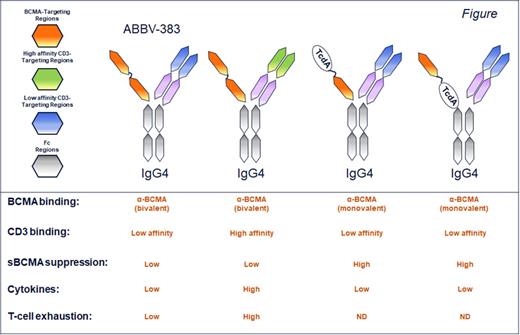Introduction: ABBV-383 is an IgG4-based CD3-bispecific T-cell engager (TCE) that has shown promising efficacy and a favorable safety profile in heavily pre-treated patients with relapsed/refractory multiple myeloma (MM). ABBV-383 possesses a unique combination of a low-affinity CD3δε antibody coupled to a bivalent, high-affinity BCMA engager arm in a 2+1 format. Prior pre-clinical studies demonstrated that ABBV-383 induces potent redirected T-cell killing of MM tumors with reduced cytokine release. Here, we provide additional evidence that bivalent BCMA binding by ABBV-383 reduces the negative impact of soluble BCMA and low affinity CD3 T-cell engagement drives sustained T-cell activation with reduced immune exhaustion.
Methods: Structural variants of ABBV-383 were created, including 1) the bivalent BCMA targeting antibody of ABBV-383 replaced by proximal and distal monovalent VH targeting molecules, and 2) BCMA antibody structures coupled to high-and low affinity CD3 variants ( Figure). For functional testing, ABBV-383 and the structural variants were added to PBMCs or T-cells from healthy donors to serve as effector cells in co-culture with BCMA-positive MM tumor cell lines. Tumor cell killing and T-cell activation were determined by flow cytometry, and cytokine production was assessed using Luminex instrumentation. Recombinant soluble BCMA (sBCMA) was utilized in the experimental models to evaluate the extent of BCMA TCE suppression. To define the relationship between CD3-affinity and T-cell exhaustion, multi-dimensional flow cytometry was performed in long-term, 28-day co-cultures with irradiated tumor cells replated every 7 days.
Results: T-cell binding was shifted by >100x with substitution of the high affinity CD3 antibody compared to ABBV-383. While all antibody variants tested induced T-cell specific MM cell killing in a BCMA-dependent manner, the negative impact of soluble BCMA on tumor killing was reduced with ABBV-383 due to its bivalent interaction with tumor cells compared to the monovalent TCE formats. In addition, the low CD3 binding affinity of ABBV-383 lowered T-cell activation antigen expression and reduced inflammatory cytokine production but resulted in similar maximal cytotoxicity of tumor cells in co-cultures of healthy and MM patient samples compared to high-affinity CD3 targeting. While maximal tumor cytotoxicity was similar, ABBV-383 was found to significantly delay the induction of a critical exhaustion-inducing transcription factor, TOX, in long-term assays. T-cell population changes were observed as early as 3 days with decreased effector memory cells (CD45RA-CD62L-) and increased naïve T-cell populations (CD62L+CD45RA+) compared to high-affinity CD3 targeting. On day 21, the high-affinity CD3 x bivalent BCMA molecule resulted in 85% of the CD8+ T-cell population expressing the transcription factor TOX compared to only 15% for ABBV-383 co-cultures. TOX induces several gene families with chromatin-modulating capacity that drive the distinct transcriptional trajectory leading to T-cell dysfunction during chronic stimulation. Simultaneous expression of multiple checkpoint inhibitory proteins is indicative of T-cell exhaustion. Triple positive CD8+ T-cells expressing LAG3, PD-1 and CTLA4 were significantly reduced by ABBV-383 versus the high-affinity CD3 variant ( Figure).
Conclusions: High avidity BCMA binding coupled to low affinity T-cell engagement distinguishes the resulting mechanism of action for ABBV-383 in MM. Here, we show that the presence of bivalent-BCMA reduced the negative impact of soluble BCMA, reduced inflammatory cytokine production, and dampened the emergence of TOX+ CD8+ T-cells indicating that ABBV-383 structure maximizes its clinical potential as a safe and effective MM therapy.
Disclosures
Sharon:AbbVie, Inc.: Current Employment, Current equity holder in publicly-traded company. Robinson:AbbVie, Inc.: Current Employment, Current equity holder in publicly-traded company. Hecquet:AbbVie, Inc.: Current Employment, Current equity holder in publicly-traded company. Calabrese:AbbVie, Inc.: Current Employment, Current equity holder in publicly-traded company. Cosgrove:AbbVie, Inc.: Current Employment, Current equity holder in publicly-traded company. Mantis:AbbVie, Inc.: Current Employment, Current equity holder in publicly-traded company. Bueno:AbbVie Inc.: Current Employment, Current equity holder in publicly-traded company. Ahsan:AbbVie, Inc.: Current Employment, Current equity holder in publicly-traded company. Chervin:AbbVie, Inc.: Current Employment, Current equity holder in publicly-traded company. Epling-Burnette:AbbVie, Inc.: Current Employment, Current equity holder in publicly-traded company. Ross:AbbVie Inc.: Current Employment, Current equity holder in publicly-traded company.


This feature is available to Subscribers Only
Sign In or Create an Account Close Modal